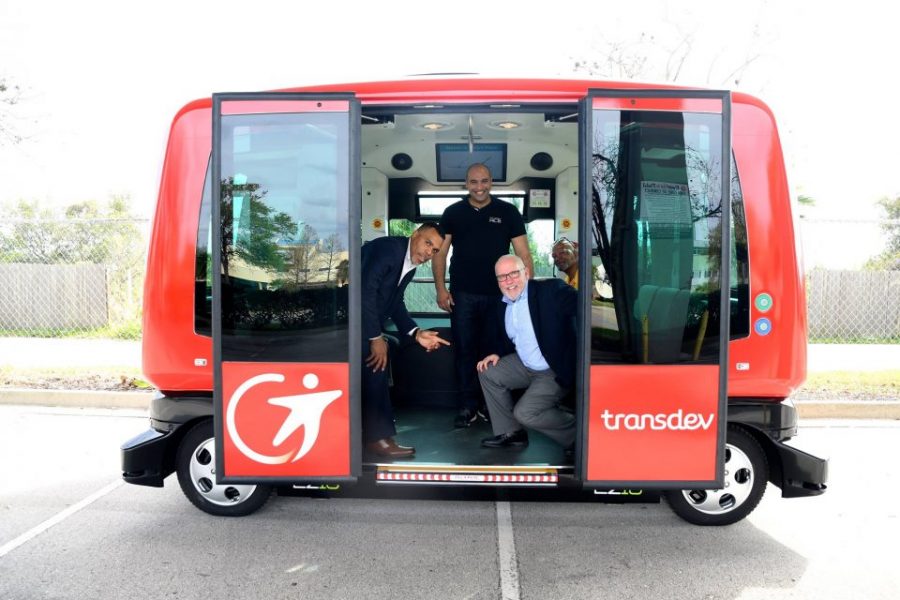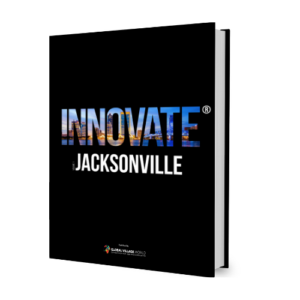The Jacksonville Transportation Authority (JTA) is an independent state agency serving Jacksonville (Duval County), with limited services in Clay, Nassau, and Baker counties. In addition to providing public transportation options in Jacksonville, the JTA designs and constructs bridges, sidewalks, and highways through the JTAMobilityWorks and Safe Routes to School program.


,
Established in 1955 as the Jacksonville Expressway Authority, in 1971, the Authority took over public transportation responsibilities and was renamed the JTA.
Today, the JTA provides regular fixed-route bus service, the largest Bus Rapid Transit (BRT) network in the Southeastern U.S. called the First Coast Flyer, a downtown elevated Skyway system (which will soon be converted to the Ultimate Urban Circulator (U2C ), the St. Johns River Ferry, Connexion and Connexion Plus Paratransit services, and shuttle service called ReadiRide, Beach Buggy, and Nassau Express Select.
Just a Quick Note:
InnovationsOfTheWorld.com has partnered with Trade License Zone (TLZ) to support global innovators looking to expand internationally. Take advantage of the UAE’s Free Zones—enjoy streamlined setup, low corporate taxes, and a strategic gateway to the Middle East and beyond.
Get Your UAE Free Zone License Fast & Easy!The JTA also provides critical paratransit services in Clay County and a growing list of “flex” routes through Clay Community Transportation.

In 2019, the JTA launched the Nassau Express, providing efficient and comfortable commutes for customers who live in Yulee, Florida, to work in Downtown Jacksonville. Other Express Select services are being planned for St. Johns and Baker counties in 2020.
The JTA has a challenging role in serving the largest city in the continental U.S. in terms of landmass, which requires an integrated transportation network. The JTA’s services are a critical element for the Jacksonville community as it manages population growth, business recruitment, and providing a better quality of life.
Under CEO Nathaniel P. Ford Sr., the JTA has also embraced new technology, through intuitive mobile apps for scheduling and fare purchase and through the power of business intelligence throughout the Authority.

The Ultimate Urban Circulator (U2C) Autonomous Vehicle Program
In January 2017, the JTA unveiled a vision for the future of the Downtown Skyway that will be modernized and expanded by converting the automated people mover to an autonomous vehicle transportation network. The U2C initiative will afford the JTA the ability to reimagine the future of public transportation.
Once completed, the U2C will comprise of four initial projects, the first of which is the Bay Street Innovation Corridor—a three mile, at-grade loop along East Bay Street on Downtown Jacksonville’s Northbank. This phase will connect the east and west sides of Downtown Jacksonville from the new Jacksonville Regional Transportation Center (JRTC) at LaVilla to the City’s sports and entertainment district.

Simultaneously the Authority is developing Autonomous Avenue, which is the first conversion of an elevated monorail system to a roadway that supports autonomous vehicles in the U.S. This first leg will serve as a proof of concept, not only for the JTA but for the entire country. That conversion will continue throughout the Skyway’s entire 2.5-mile footprint with at-grade connections to serve a 10-mile network that flows through neighborhoods near Downtown Jacksonville.
The Bay Street Innovation Corridor received the backing of the Federal Transit Administration (FTA) in December 2018 with the award of a $12.5 million Better Utilizing Investments to Leverage Development or BUILD grant. This $44 million phase is actively in the planning and development phase.
Meanwhile, the second iteration of the Transit Concepts and Alternatives Review (TCAR) planning exercise is underway. The study will identify alternatives for each of the proposed Skyway corridor extensions into Riverside and Five Points, San Marco, and the Southbank Medical Complex, to UF Health and the VA Outpatient Clinic to the north, and the Sports and Entertainment District.

Jacksonville Regional Transportation Center at LaVilla
The JRTC at LaVilla is the JTA’s new main transit hub and headquarters for administrative offices, located in the historic LaVilla neighborhood of Downtown Jacksonville.
This multimodal hub will bring together JTA’s fixed-route bus lines, the First Coast Flyer BRT network, the Skyway, and the U2C, ride-hailing, and other shared services, along with other modes of mobility when it opens to the public in March 2020.
The 66,000 square-foot building features a diagonal patterned clear anodized aluminum curtain wall with two-colored spandrel glass – an energy-efficient and beautiful edition to the Jacksonville skyline in LaVilla. Outside, a 22,000-square-foot entrance plaza will welcome more than 42,000 customers daily at capacity, with easy access to the 21 bus bays.

Inside, the building features energy-efficient LED lighting, smart office design, incubator space for entrepreneurs, and the JTA’s administrative offices.
Phase One was completed in April 2018 and is called the Intercity Bus Terminal (IBT). This LEED Silver Certified facility serves Greyhound Lines, MegaBus, and RedCoach. A pedestrian bridge above Forsyth Street will connect the IBT to the JRTC in 2020.

Transit-Oriented Development
Transit-Oriented Development, or TOD, is a strategy the JTA is pursuing to encourage the development of high-density, mixed-use projects built within close proximity to public transportation hubs or stations. This type of development places more emphasis on pedestrian needs, incorporating wider sidewalks, bike and alternative-transportation lanes, slower traffic, and smarter intersections.
TOD has already begun in the historic LaVilla neighborhood with the Intercity Bus Terminal, which opened in 2018, and the Jacksonville Regional Transportation Center, which opens in March 2020.
The JTA is now seeking unsolicited proposals to develop five Authorityowned and underutilized parcels in LaVilla, Downtown Jacksonville and around the city.

Properties include the 1.5-acre Rosa Parks Transit Hub, which will no longer be the JTA’s main transit hub after JRTC opens in March 2020. Half of the property will be prepped for TOD, and the remaining half will still service at least three bus routes and the Skyway.
Other real estate tapped for TOD include the JTA’s Golfair Boulevard property, which is connected to a First Coast Flyer Green Line stop. On the Downtown Southbank, surrounded by existing residential, office, retail, and dining, the JTA is working to jointly develop properties near the Kings Avenue Skyway Station and parking garage. Additionally, the JTA believes roughly 4 acres near The Avenues Park-n-Ride facility, near Philips Highway and Southside Boulevard, is prime for TOD.

JTAMobilityWorks Capital Improvement Programs
JTAMobilityWorks is a program designed to complete projects funded by the extension of the Local Option Gas Tax in Jacksonville. Leveraging that future funding, JTA issued $100 million in bonds to cover the cost of 13 roadway projects in 14 Mobility Corridors within a five-year period.
In 2019, the JTA completed a major road-widening project along Girvin Road in Southeast Jacksonville and launched projects along Kernan Boulevard and Collins Road.
In 2020, work will begin on another road improvement project along San Pablo Road, and a new turbo roundabout at the corner of Merrill Road and University Boulevard, in front of the Jacksonville University Campus main entrance.
The Safe Routes to School program is already creating better pedestrian connections for students and families in Atlantic Beach, North Jacksonville, and in Arlington.
















